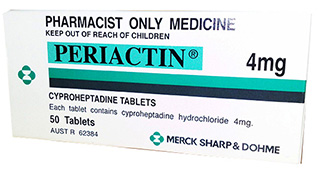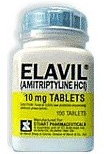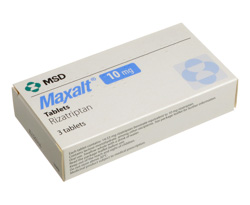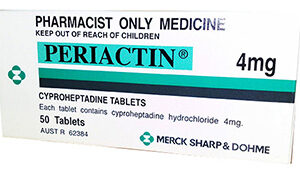Periactin Medication Overview
Periactin is the brand name for the prescription drug cyproheptadine, an antihistamine used for the treatment of allergic reactions, specifically symptoms such as itching, runny nose, sneezing, and hives. It is also sometimes used to stimulate appetite in individuals with eating disorders or those who are underweight and need to gain weight.
Chemical Composition
Cyproheptadine hydrochloride, the active ingredient in Periactin, is a serotonin and histamine antagonist with anticholinergic and sedative effects. Its chemical name is 4-(5H-dibenzo[a,d]cyclohepten-5-ylidene)-1-methylpiperidine hydrochloride. The medication is structurally related to tricyclic antidepressants.
Dosage and Administration
Dosage varies depending on the age and condition of the patient. Periactin is available in 4 mg tablets and a syrup containing 2 mg of cyproheptadine hydrochloride per 5 mL. Adolescent and adult doses typically start at 4 mg three times a day, with the ability to adjust based on efficacy and tolerability. Doses for children aged 2-6 years usually start at 4 mg per day, divided into smaller doses.
Pharmacokinetics
After oral administration, cyproheptadine is well-absorbed from the gastrointestinal tract. Its peak plasma concentrations occur 1 to 3 hours post-ingestion. Periactin is metabolized in the liver and has a half-life range of 8 to 12 hours. The medication is excreted primarily through the feces, with some excreted in the urine.
Therapeutic Indications
Periactin is indicated for the treatment of perennial and seasonal rhinitis, allergic conjunctivitis due to inhalant allergens and foods, mild and uncomplicated allergic skin manifestations of urticaria and angioedema, and amelioration of allergic reactions to blood or plasma. It is also indicated for the treatment of anorexia, cachexia, or a malnourished state requiring appetite stimulation.
Contraindications and Cautions
Cyproheptadine is contraindicated in persons with hypersensitivity to the drug, patients with narrow-angle glaucoma, stenosing peptic ulcer, symptomatic prostatic hypertrophy, bladder neck obstruction, or pyloroduodenal obstruction. It is also contraindicated in newborn or premature infants and during an acute asthmatic attack. Use with caution in patients with a history of cardiovascular disease, glaucoma, or hyperthyroidism.
Drug Interactions
Periactin has the potential to interact with other medications, including other central nervous system depressants (e.g., alcohol, sedatives, and tranquilizers), monoamine oxidase inhibitors (MAOIs), and SSRIs—one must consider potential interactions with these substances before prescribing or consuming Periactin. It may also have additive anticholinergic effects if used with other anticholinergic drugs.
Adverse Reactions/Side Effects
The most common side effects of cyproheptadine are sedation, sleepiness, dizziness, disturbed coordination, restlessness, and excitement. Dry mouth, gastrointestinal disturbances such as diarrhea, constipation, or nausea, blurred vision, and urinary retention are also reported. In some cases, patients may experience weight gain due to increased appetite.
Pediatric Usage Considerations
For children, administration of Periactin must be specifically tailored to the child’s weight and response to therapy. Overdose symptoms in children may include central nervous system excitement, leading to convulsions, hallucinations, and in some cases, respiratory and cardiac arrest.
Elderly Usage Considerations
In elderly patients, the dose of Periactin may need to be reduced due to the increased potential for dizziness, sedation, and hypotension, as well as the increased risk of falls. Elderly patients are more likely to experience adverse reactions attributable to the anticholinergic effects of the drug.
Use During Pregnancy and Lactation
Periactin is classified as a category B drug for pregnancy. There are no controlled studies in pregnant women, and cyproheptadine should only be used during pregnancy if the potential benefit justifies the potential risk to the fetus. Cyproheptadine is excreted in breast milk, and caution is advised when administering to a nursing woman.
Instructions for Overdose
In the event of overdose, symptomatic and supportive measures are recommended. This can include inducing emesis if the patient is alert, performing gastric lavage, and managing symptoms such as hypotension, respiratory depression, and convulsions with appropriate interventions. Activated charcoal may be administered to help absorb excess medication.
Storage and Handling
Store Periactin at room temperature, between 68-77 degrees F (20-25 degrees C), away from light and moisture. Keep all medications out of reach of children and pets to prevent accidental ingestion.
Patient Monitoring and Follow-Up
Regular monitoring of patients on Periactin is essential to ensure appropriate response to treatment and to watch for the development of adverse reactions. Follow-up visits should assess weight gain, side effects, and overall patient well-being, adjusting the dosage as needed for optimal therapeutic effect.
Information on Missed Dose
In the event that a dose is missed, advise the patient to take the missed dose as soon as remembered unless it is near the time of the next scheduled dose. In that case, they should skip the missed dose and resume their usual dosing schedule. Doubling up on doses is not recommended.







Reviews
There are no reviews yet.